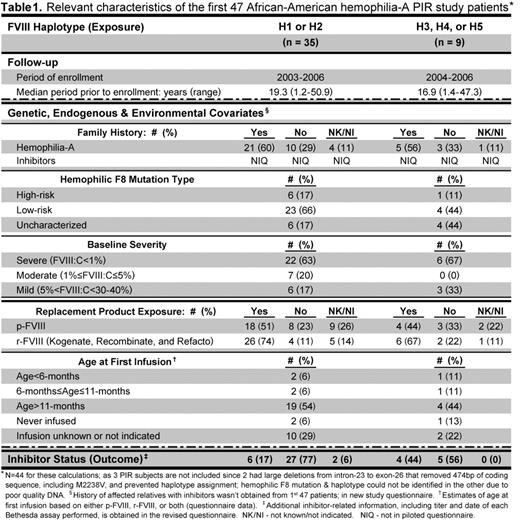Abstract
Alloantibodies that inhibit the function of wildtype (wt) FVIII molecules constitute the most serious complication of replacement therapy for hemophilia (H)A patients. Although it is not possible to accurately predict which patients will develop inhibitors, ethnicity is a known risk factor as alloimmunization occurs ~2−fold more often in African Americans (AAs) than in Caucasians (Cs). Analysis of data from a resequencing study revealed that the FVIII gene (F8) contains four nonsynonymous−single nucleotide polymorphisms (ns−SNPs) that encode six distinct wt FVIII proteins designated haplotype (H)1−H6. While AAs express all but H6, only H1 and H2, the two recombinant (r)−FVIII proteins used clinically, are expressed by Cs. About 25% of AAs express H3, H4, or H5, proteins that differ structurally from r−FVIII at three ns−SNPs (R484H, D1241E, M2238V), two of which are located in dominant inhibitor epitopes and have AA−restricted minor−alleles. We designed the Pharmacogenetics of Inhibitor Risk (PIR) study to test the hypothesis that these ns−SNPs, when allelically mismatched in replacement therapy, are pharmacogenetic risk factors that contribute to the greater incidence of inhibitor development in patients of African−descent. We enrolled 94 of 223 total AA HA patients from collaborating treatment centers. Table 1 presents characteristics of the first 47 subjects (whose functional F8 regions have been resequenced entirely) including: FVIII haplotype (exposure) − H3/H4/H5 vs H1/H2; inhibitor status (outcome) − yes/no; F8 mutation − high−risk vs low−risk types; other covariates and potential confounders. A preliminary analysis demonstrated an odds ratio of 3.6 for inhibitors developing in the exposed subjects (P=0.10; 95% CI=0.7–17.6). Our finding suggests that pharmacogenetic factors may indeed contribute to the increased incidence of this alloimmune complication in AAs. To increase the power to detect a true association and allow adjustment for confounders, we are currently completing F8 resequencing in the next 47 patients.
Relevant characteristics of the first 47 African-American hemophilia-A PIR study patients*

Disclosures: I am the co−founder of a new start−up company called Haplomics and currently own 42.5% of its shares.
Author notes
Corresponding author

This feature is available to Subscribers Only
Sign In or Create an Account Close Modal